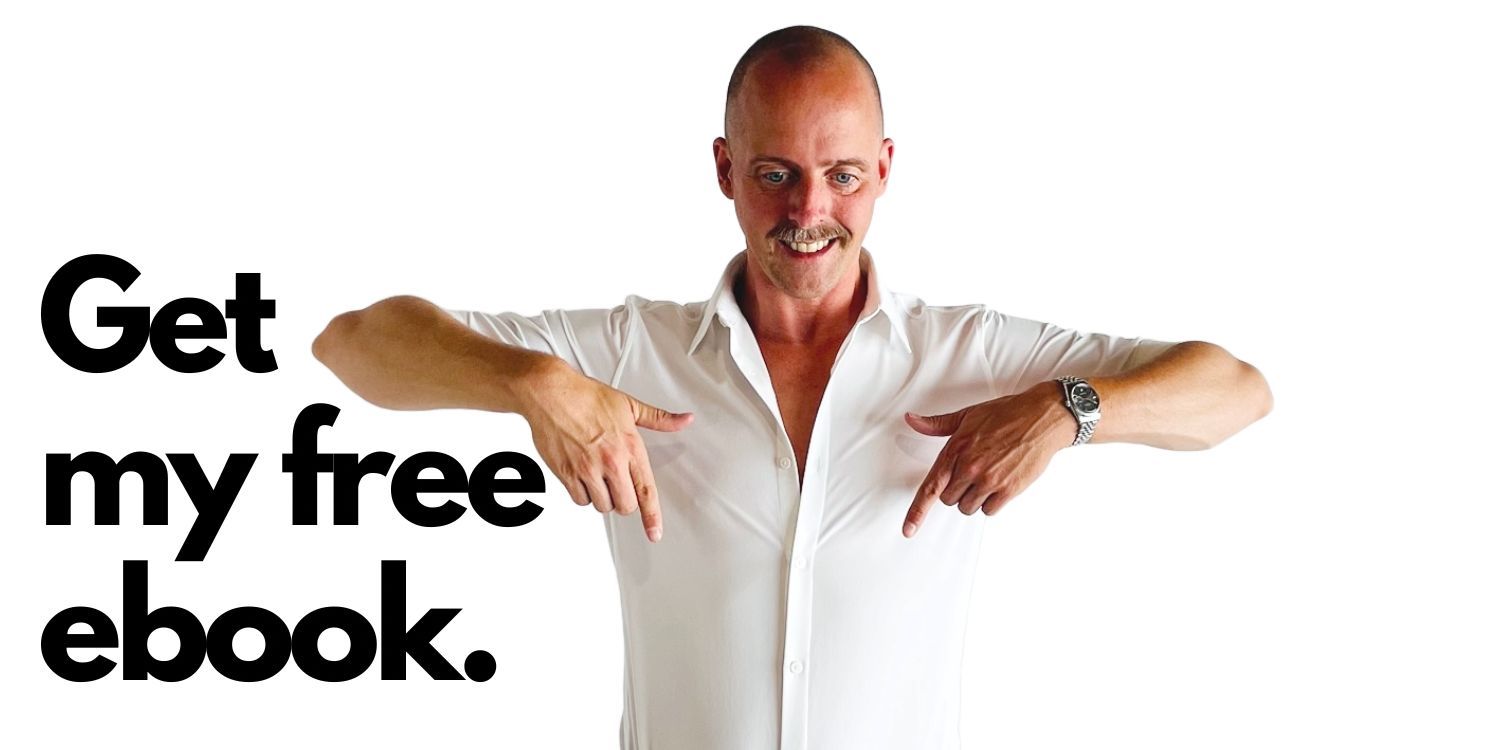How Pride Helps to Heal From Shame and Guilt
Jun 1
/
René Luisman
June is known worldwide as Pride month. What in the 70’s started as a protest march for the rights of the LGBTI community is now a way to celebrate freedom and diversity in many countries. But Pride also has a healing function for many gay men.
In the acceptance of freedom and diversity, the discussion usually revolves around acceptance in society. For decades activists have been climbing the barricades to fight for the rights of the LGBTI+ community. Less attention is paid to the inner struggle for self-acceptance that every LGBTI person has to deal with. What is the impact if you do not meet the social norm of gender or sexuality?
How homosexuality is still associated with shame and guilt
Imagine. During your puberty, you discover that your sexual preference differs from that of your parents, family, and friends. In most cultures, you still subconsciously get the message that sexuality is something between a man and a woman. And even if you grew up in an environment in which sexual diversity is accepted, the message is often still that it is fine to be gay but that you should not show it too much.
So your first tendency is probably to deny or hide your feelings. You adjust to what you think others expect of you. Or you go to the other end of the spectrum, and your attitude becomes indifferent or even defensive.
Because with the realization that you do not meet the social norm comes a sense of shame at the identity level. Shame for who you are and what you feel. This feeling is reinforced by guilt as soon as you express your sexual preference. Guilt for doing something you suspect your environment will disapprove of.
And unlike other minority groups, you as a gay man do not learn from your parents how to take your place in the world despite shame and guilt. You usually walk that road alone.
The coming out is only the beginning of a search for yourself
Then comes the moment of your coming out. You gather all your courage, confide in others and share your true identity. And with that, it is often done for the outside world. But the fact that you hid a part of yourself in a vulnerable phase of life determines how you view yourself and how you make contact. Something that can also affect your adult life.
Because it is precisely in this adult life that you examine which parts are really yours and which parts you have created to protect yourself. Based on the messages of your childhood, you may have drawn the belief that you are not good enough. That your feelings and emotions are not welcome or that it is not okay to be yourself.
And because you do not feel this confirmation within, you are always looking for validation that you matter. As a person, as a friend and as a partner. You quickly focus your attention on the other person, you suppress your own feelings and emotions, or unconsciously you put on a mask to hide them. Yet, there is a deep desire to reconnect with yourself and others.
And because you do not feel this confirmation within, you are always looking for validation that you matter. As a person, as a friend and as a partner. You quickly focus your attention on the other person, you suppress your own feelings and emotions, or unconsciously you put on a mask to hide them. Yet, there is a deep desire to reconnect with yourself and others.
How shame and guilt can get stuck in the body
In my work with gay men, I noticed that many of them struggle with the same themes. Social anxiety, depression, physical dissociation and difficulty making a meaningful connection. Symptoms are very similar to those of traumatic events.
Now, when you think of trauma, you may think of violent events such as an accident, rape, or abuse. But how traumatic is it when you discover as a child that you do not meet the standards of identity and you fear the consequences this has?
Trauma treatment expert Peter Levine describes in his book ‘The Tiger Awakens’ that many people have traumatic symptoms that go unrecognized. He describes trauma as an unfinished movement in which the energy is fixed in the body.
So you discover that you are different, sexual energy arises, and at the same time, you suppress this emotion through shame and guilt. And if you zoom in further, more similarities indicate that coming out can be traumatic for some men.
Dissociation and hyper-alertness
During one of our coaching sessions, Vincent said: 'It's like I can't connect with my own feelings and emotions. I'm constantly in my head, and it seems like I can't get to my feelings. And when I do experience fear or anger, these feelings are so overwhelming that I push them away.'
One of the hallmarks of trauma is the emotional distance from others, making it seem like you are experiencing the world from a distance. There is also the same distance to your own emotional world. It is mainly feelings of fear, anger and shame that are easily accessible.
Another characteristic is that traumatized people are often hyper-alert because they do not feel safe at the core. I also see this in the men I supervise. They are very aware of their environment and unconsciously adjust their behavior to it. Or they numb themselves with alcohol or drugs, so they do not have to feel.
Usually, these symptoms do not manifest themselves until years later. But they unconsciously influence every new encounter and event. And instead of moving freely and spontaneously, the trauma still unconsciously grips you.

Does this mean every gay man is traumatized?
No, definitely not. Whether the period surrounding your coming out was traumatizing depends on several factors. How threatening was this situation for you? What support did you experience in your environment? What skills did you learn that were helpful? And to what extent were you able to influence the situation? All of this determines how you experienced the situation and how you dealt with it.
Trauma has two opposing mechanisms. On the one hand, you do everything to stay away from this pain. And on the other hand, you are drawn to it again and again. This costs an unnecessary amount of energy and is at the expense of your spontaneity and authenticity. By seeing the period around a coming-out as a possible traumatic event, there is more awareness for the symptoms. And it gives direction to break and heal this dynamic.
How to overcome the trauma of sexual diversity
Connection with the other arises from the connection with yourself. And that is precisely where many men have lost connection. So how do you restore this connection? We often try to solve a problem in the same way that it started. In this case, we go to our heads and think of all the possible ways we can reconnect with ourselves and others. But the relationship with yourself is also the relationship with your body. The very parts that we have once split off or condemned are the key to healing ourselves again.
If you are willing to descend to the places where you were once hurt, you can explore which part of you needs attention. It is sometimes quite overwhelming at first. Because you may find disappointment, anger, or sadness there. Then know that these feelings say nothing about your worth. It does say something about what you missed and what you may still long for. By letting these feelings in, it will naturally calm down inside. Trust that your gut tells you what you need and dare to ask someone you trust. This way, you take responsibility for your own needs.
What does this have to do with Pride?
Back to Pride. How do protest marches, parties, and rainbow flags help to reconnect with yourself and others? You can see Pride as a protest march, a social discussion, or even a commercial marketing stunt. But when you view Pride as part of the recovery process from a traumatic event, the role of the environment and one's own "tribe" plays a crucial role. When the step to accept and welcome yourself is still too big, it is a powerful gesture when the world around you confirms that you are welcome. This support from both the LGBTI community and straight allies is an important step in the process of self-acceptance.
You read an article by Gay Men Coaching
How I can support you:
- Self Love Course - Learn step by step how to build a positive self image.
- Men's Group - Find out how other gay men deal with issues such as intimacy and sexuality.
- Coming-out program - If you could use some support before, during or after your coming-out.
- Individual coaching - If you want to improve the relationship with yourself or others.
And more about me and my approach:
Follow me on:

Get in touch
-
Geestbrugkade 32, 2281 CX Rijswijk, Netherlands
-
contact@reneluisman.nl
-
Chamber of Commerce number: 59693908
-
IBAN: NL49 KNAB 0259 9752 22
Join Our Newsletter
Get monthly updates on news, articles, tips and more.
Thank you!
Gay Men Coaching © 2014 - 2025

with 5 powerful tools to feel confident
As a bonus you will receive a monthly e-mail with tips & inspiration. You can easily unsubscribe at the bottom of every newsletter.
